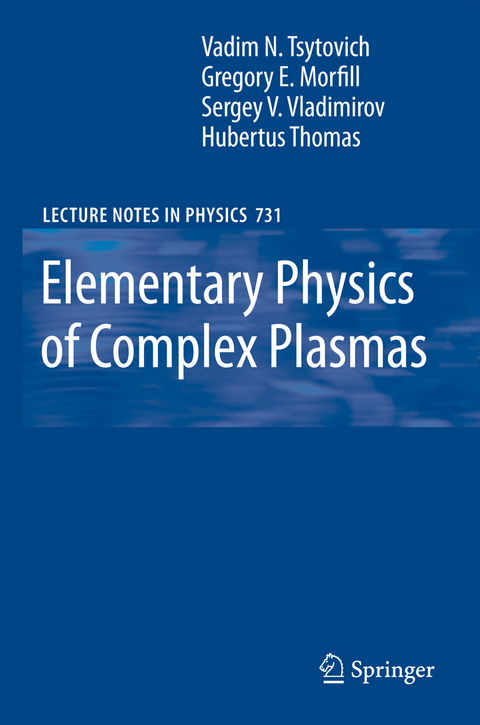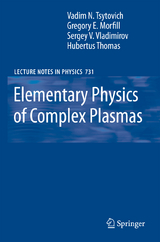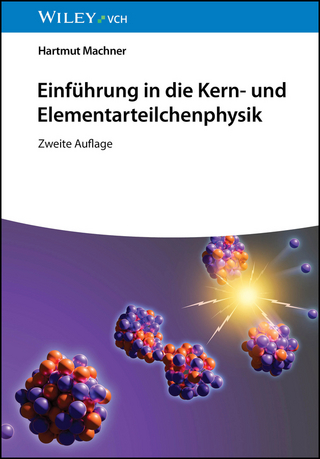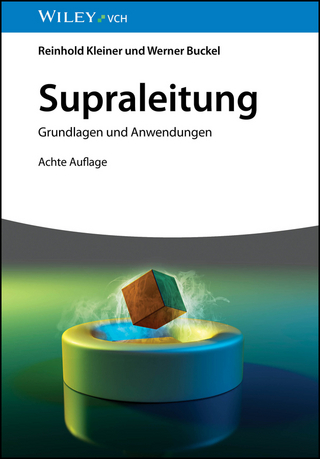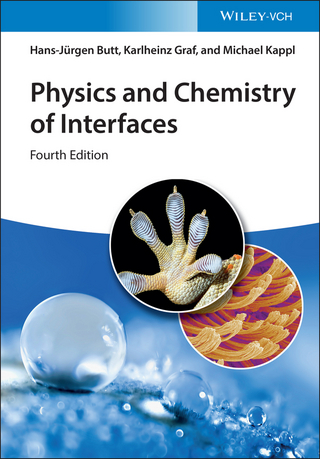Elementary Physics of Complex Plasmas
Springer Berlin (Verlag)
978-3-540-29000-1 (ISBN)
Complex plasmas are dusty plasmas in which the density and electric charges of the dust grains are sufficiently high to induce long-range grain-grain interactions, as well as strong absorption of charged-plasma components. Together with the sources replenishing the plasma such systems form a highly dissipative thermodynamically open system that exhibits many features of collective behaviour generally found in complex systems. Most notably among them are self-organized patterns such as plasma crystals, plasma clusters, dust stars and further spectacular new structures. Beyond their intrinsic scientific interest, the study of complex plasmas grows in importance in a great variety of fields, ranging from space-plasma sciences to applied fields such as plasma processing, thin-film deposition and even the production of computer chips by plasma etching, in which strongly interacting clouds of complex plasmas can cause major contamination of the final product.
Intended as first introductory but comprehensive survey of this rapidly emerging field, the present book addresses postgraduate students as well as specialist and nonspecialist researchers with a general background in either plasma physics, space sciences or the physics of complex systems.
1 Complex Plasma - Why It Is an Unusual State of Matter?.- 1.1 General Physical Differences Between Complex Plasma and Ordinary Matter.- 1.2 General Terminology in Complex Plasma and Ordinary Matter.- 1.3 History: Complex Plasmas in Space Physics.- 1.4 Problems of Strong Coupling in Plasmas.- 1.5 Openness of Complex Plasma Systems and Long-range Collective Interactions.- 1.6 Plasma Condensation.- 1.7 Special Aspects of Complex Plasma Investigations.- 1.8 Structures and Self-organization in Complex Plasmas.- 1.9 Outlook of the Subsequent Presentation.- References.- 2 Why Complex Plasmas Have Many Applications in Future Technology?.- 2.1 Main Discoveries in Applications of Complex Plasmas.- 2.2 Computer Technology.- 2.3 First Steps to Using Complex Plasma Properties in Computer Industry.- 2.4 New Surfaces, New Materials.- 2.5 New Energy Production.- 2.6 Environmental Problems.- References.- 3 Elementary Processes in Complex Plasmas.- 3.1 Screening of Grain Field in a Plasma.- 3.2 Charging of Grains in Partially Ionized Plasma.- 3.3 Forces Acting on Ions.- 3.4 Forces Acting on Grains.- 3.5 Forces Acting on Electrons: Characteristic Electric Fields.- References.- 4 Collective Effects in Complex Plasmas.- 4.1 Collective Linear Modes.- 4.2 Universal Instability of a Complex Plasma.- 4.3 Collective Modes Excited by Fast Particles.- 4.4 Observations of Collective Modes.- 4.5 Problems to be Solved for Collective Modes.- 4.6 Fluctuations, Collective Pair Interactions, and Pair Correlation Functions.- References.- 5 Micro-particle Collective and Non-collective Pair Interactions.- 5.1 General Properties of Micro-particle Pair Interactions.- 5.2 Shadow Non-collective Attraction Forces.- 5.3 Collective Attraction for Linear Screening.- 5.4 Collective Interactions for Non-linearScreening.- 5.5 Measurements of Screened Potential in Grain-grain Collisions.- References.- 6 Experiments on Plasma Crystals and Long-range Correlations.- 6.1 Plasma Crystals.- 6.2 Melting and Phase Transitions.- 6.3 Paradigms for Plasma Crystal Formation.- 6.4 Inspiration from Experiments.- References.- 7 Mono-layer Plasma Crystals and Clusters.- 7.1 Mono-layer Plasma Crystals.- 7.2 2D Plasma Clusters.- References.- 8 Comments on Other Dust Structures: Concluding Remarks.- 8.1 Dust Helical Clusters.- 8.2 Disordered Grain Structures.- 8.3 Dust Wall Sheaths.- 8.4 Dust Structures between Walls.- 8.5 Dust Convection in Structures.- 8.6 Hybrid Dust Structures.- 8.7 Micro-gravity Experiments.- 8.8 Future Research: Outlook for Complex Plasmas.- 8.9 Conclusion.- References.
From the reviews:
"This book offers a state-of-the-art in research and scientific achievements in a relatively new, now rapidly developing field of complex plasma media. ... Each of the eight chapters is supplemented by a comprehensive list of up-to-date references as well as suggestions for the future work. To conclude, this book is no doubt of a unique value to researchers in the field of dusty plasmas as well as to graduate students in physics, astrophysics, and in technical sciences." (Vladimir Cadez, Zentralblatt MATH, Vol. 1151, 2009)
"Written primarily for researchers in the field of complex (dusty) plasmas, but it contains enough introductory material ... for a topical course on the physics of complex plasmas. ... The book contains an extensive list of references ... very helpful to anyone preparing a manuscript for publication or a research proposal. ... an excellent addition to the present collection of books on complex (dusty) plasmas. This book is recommended to anyone wishing to acquire a firm understanding ... of the complex plasma state." (Robert L. Merlino, Plasma Physics, Vol. 75 (5), 2009)| Erscheint lt. Verlag | 5.12.2007 |
|---|---|
| Reihe/Serie | Lecture Notes in Physics |
| Zusatzinfo | XIV, 370 p. 129 illus., 2 illus. in color. |
| Verlagsort | Berlin |
| Sprache | englisch |
| Maße | 155 x 235 mm |
| Gewicht | 655 g |
| Themenwelt | Naturwissenschaften ► Physik / Astronomie ► Atom- / Kern- / Molekularphysik |
| Naturwissenschaften ► Physik / Astronomie ► Plasmaphysik | |
| Schlagworte | complex plasmas • dusty plasma • dusty plasmas • Plasma • Plasma Cluster • Plasma Crystals • Plasmaphysik • Star |
| ISBN-10 | 3-540-29000-1 / 3540290001 |
| ISBN-13 | 978-3-540-29000-1 / 9783540290001 |
| Zustand | Neuware |
| Haben Sie eine Frage zum Produkt? |
aus dem Bereich
